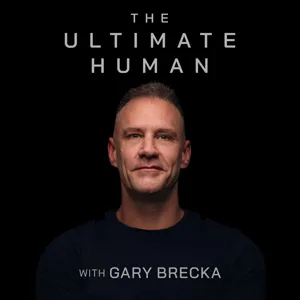Podcast Summary
Metabolic Disorders: A Possible Common Cause of Mental Illnesses: Metabolic disorders affecting brain energy may cause mental illnesses like anxiety, depression, ADHD, and bipolar disorder. Lifestyle changes, such as adopting a ketogenic diet, may help address these issues and potentially cure mental illnesses, but more research is needed.
According to Dr. Christopher Palmer, a Harvard psychiatrist and author of "Brain Energy," mental illnesses, including anxiety, depression, ADHD, and even bipolar disorder, may have a common root cause: metabolic disorders affecting the brain. These disorders can lead to insufficient energy for brain cells, impairing their function. Despite increased research and resources dedicated to mental health, mental illness remains a mystery to cure due to the lack of understanding of its underlying cause. Most treatments only alleviate symptoms and do not provide a cure. Dr. Palmer suggests that certain lifestyle changes, such as adopting a ketogenic diet, may help address these metabolic issues and potentially cure mental illness. However, more research is needed to validate this theory and explore its implications.
Understanding Common Underlying Causes of Mental Illnesses: Depression is the leading disabling disorder, and treatments like medication and talk therapy have limited effectiveness due to the lack of definitive diagnostic tests and understanding of common underlying causes.
Mental illnesses, such as depression, anxiety, OCD, and bipolar, share some common underlying causes, despite the current approach to treatment focusing on reducing symptoms rather than addressing the root cause. Depression is the leading disabling disorder, surpassing even physical illnesses like cancer and heart failure. Treatment methods include physiological approaches, like medication for neurotransmitter imbalances, and psychological approaches, like talk therapy for maladaptive thoughts. However, the effectiveness of these treatments is hit or miss, leaving many patients without relief. The lack of definitive diagnostic tests for mental illness adds to the challenge, as diagnoses rely on subjective patient reports. Mental illnesses are only considered mental disorders when no objective cause can be identified. The goal is to find a common underlying pathway for mental illness to improve treatment effectiveness. Overlaps in mental illnesses include shared symptoms and potential causes, such as genetics, environment, and brain structure.
Mental disorders often come with multiple diagnoses and overlapping symptoms: People with mental health issues often have co-occurring disorders and one gene can increase the risk for various mental disorders, challenging the notion of distinct disorders
Mental disorders, as diagnosed by the Diagnostic and Statistical Manual of Mental Disorders (DSM), do not exist in isolation. Most people with mental health issues have multiple diagnoses, and there is significant overlap in symptoms and underlying causes. For instance, research shows that people with schizophrenia are more likely to have co-occurring depression and anxiety, and vice versa. Moreover, recent findings in genetics suggest that one gene can confer risk for various mental disorders, challenging the notion of distinct disorders with specific causes. This research also hints at a possible connection between mental illness and metabolic health, as mental disorders and metabolic conditions have a long-documented familial link.
The Connection Between Metabolic Health and Mental Health: People with mental disorders are more likely to develop metabolic conditions and vice versa. Metabolic issues in the brain can lead to symptoms of various mental illnesses.
There is a strong connection between metabolic health and mental health. This relationship goes both ways – people with mental disorders, such as psychosis, are more likely to develop metabolic conditions like diabetes, and vice versa. Research dating back to the 1940s has shown metabolic abnormalities in the brains and bodies of people with mental disorders, including depression, anxiety, PTSD, and bipolar and schizophrenia. These studies measure brain metabolism and have identified numerous metabolic problems. Metabolism is the body's way of using energy, and issues like diabetes, obesity, and cardiovascular problems are often linked to mental health issues. In fact, people with depression are twice as likely to have heart attacks, and the mentally ill, on average, die earlier from heart attacks. This connection is not just a correlation, but an underlying cause. The malfunction of brain cells due to insufficient energy or nutrients can lead to underactivity or overactivity, resulting in symptoms of various mental illnesses.
Mitochondria's role in neurotransmitter production and regulation: Proper mitochondrial function ensures correct neurotransmitter production and release, while malfunctioning mitochondria can lead to mental health issues through excess or deficiency of neurotransmitters, even in low-energy conditions.
Metabolism plays a crucial role in neurotransmitter production and regulation, particularly through the action of mitochondria. These energy-producing structures not only create the necessary building blocks for neurotransmitters but also help release them. When mitochondria function properly, they ensure that neurotransmitters are produced and released in the correct amounts. However, when mitochondria malfunction, they can lead to either an excess or deficiency of neurotransmitters, which can contribute to various mental health conditions. Interestingly, even when cells don't have enough energy, they can still exhibit hyper-excitability, leading to mental illness symptoms. This paradox highlights the intricate relationship between metabolism, mitochondria, and brain function.
The Connection Between Metabolism and Mental Health: Metabolism significantly impacts mental health through hormones, insulin, and inflammation. Understanding these connections could lead to new prevention and treatment strategies for mental disorders.
Metabolism plays a significant role in mental health and mental illness. Depression, for instance, can be a result of hyper-excitable depression systems in the brain, which can be influenced by metabolic health. Hormones, including cortisol, estrogen, testosterone, and thyroid hormone, are produced by the mitochondria and impact brain function and metabolism. Insulin, a hormone often associated with diabetes, also plays a crucial role in brain metabolism and mental health. Research shows that insulin resistance in childhood is linked to a higher risk of developing mental disorders like bipolar disorder and schizophrenia. Inflammation, another factor in mental health, is connected to metabolism. While inflammation can contribute to mental illness for some people, it's not the sole cause. Overall, understanding the connections between metabolism, mitochondria, and mental health can lead to potential prevention strategies and treatment options for various mental disorders.
Diet's Impact on Mental Health: A poor diet can lead to mental health issues, while healthy dietary choices can improve overall health and well-being.
A bad diet can have significant impacts on both physical and mental health. A diet high in processed foods, sugar, and unhealthy fats can lead to metabolic dysfunction, which can increase the risk of mental health issues such as depression, anxiety, bipolar disorder, and schizophrenia. This is due to the fact that the brain is a highly energy-consuming organ and relies on proper nutrition to function optimally. Additionally, research shows that specific dietary interventions, such as the ketogenic diet, can have a positive impact on mental health conditions like epilepsy and even chronic serious mental illnesses like schizophrenia. Overall, the food we eat plays a crucial role in our overall health and well-being, and making healthy dietary choices can have far-reaching benefits.
Mental illnesses may be caused by metabolic problems: Metabolic issues could cause mental disorders like schizophrenia, but not all mental health issues are caused by poor diet and not everyone responds to diet interventions the same way. Depression can be a normal response to adversity and not a brain disorder. Metabolic problems can also be caused by factors other than diet.
Mental illnesses, including schizophrenia, may be caused by metabolic problems. Doris's story is a powerful example of this, as her symptoms of schizophrenia went into full remission after trying the ketogenic diet. However, it's important to note that not all mental health issues are caused by metabolic problems, and not everyone will respond to diet interventions in the same way. Depression, for instance, can be a normal response to adversity and doesn't necessarily indicate a brain disorder. Metabolic problems can also be caused by factors other than poor diet, such as toxins. Overall, understanding the potential connection between mental health and metabolism could lead to new treatments and approaches for those suffering from chronic mental disorders.
Metabolic issues impact mental health beyond weight gain: Smoking, alcohol, loneliness, stress, and poor lifestyle choices contribute to metabolic disorders, increasing the risk for cardiovascular disease, insulin resistance, type 2 diabetes, depression, and premature death.
Metabolic issues are not just related to weight gain or obesity. Smoking and alcohol, as metabolic toxins, contribute to an increased risk for cardiovascular disease, insulin resistance, type 2 diabetes, and depression, even though smokers and heavy drinkers may weigh less. Additionally, mental health issues like loneliness and stress can lead to metabolic disorders and premature death. The Brain Energy Theory of mental health emphasizes the interconnectedness of mental and metabolic health. Doctors diagnosing and treating mental illness with this approach would conduct a comprehensive assessment of both mental and metabolic markers, including lifestyle factors that impact metabolism, such as diet, exercise, stress, and lack of sleep. This holistic approach recognizes that various factors beyond diet can affect metabolism and, in turn, mental health.
Linking mental health to metabolic issues: Addressing lifestyle factors like diet, sleep, and stress could potentially solve mental health issues for many people, improving mental health and reducing the risk for conditions like prediabetes, diabetes, and heart attacks.
Dr. Chris Palmer, a psychiatrist and author, believes that mental health issues, including depression, may be linked to metabolic problems. He suggests that addressing lifestyle factors, such as diet, sleep, and stress, could potentially solve the problem for many people. This approach not only improves mental health but also reduces the risk for conditions like prediabetes, diabetes, and heart attacks. Palmer's theory doesn't replace existing treatments but offers a new perspective on their effectiveness. He encourages focusing on overall well-being by eating well, exercising, and reducing stress. To learn more about his work, visit his website, brainenerg.com.













